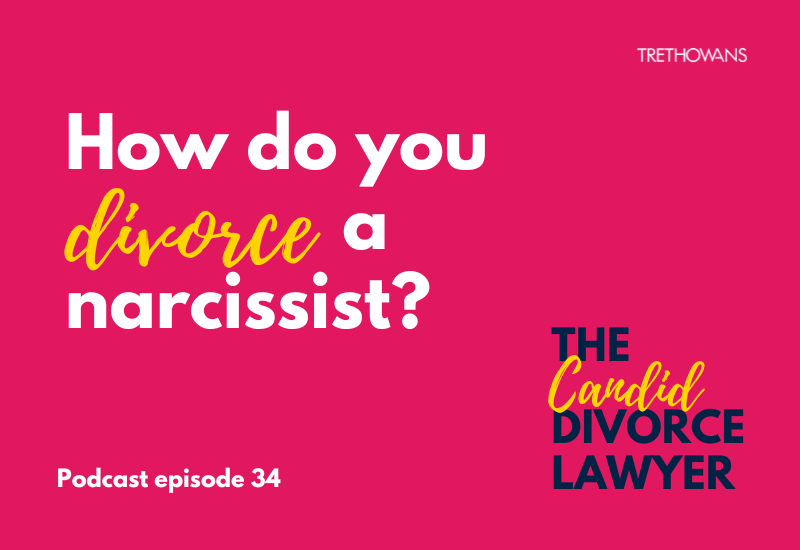- 15 Sep 2024
- •
- 3 min read
Divorcing a narcissist

Narcissism is a personality trait often highlighted in high-conflict divorces. Dr. Mark Banschick, who coined the term “the Malignant Divorce,” describes narcissists as “completely self-serving and selfish.” Protecting your emotional wellbeing is crucial when navigating the challenges of negotiating or divorcing someone with these traits.
How to divorce a narcissist
According to Dr. Banschick a narcissistic spouse, “completely dismisses any of your needs, or all the years of devotion and mutual companionship that you had built together. People without this behaviour remember the good from the past. It informs a sense of balance and fairness during a divorce (even through a betrayal).
You may be getting a divorce, but that doesn’t mean that you don’t have valuable memories and a life story together. For the narcissist, it is all gone; like it never happened. You will have to understand this if you are to deal effectively with them. The narcissist can undermine you with your friends, with your children and steal your money, all while looking sincere and generating good will among the community.
Stages of divorcing a narcissist
Our family law team don’t create and fan the flames of conflict at home. They have developed a considered approach to family law. Emma Wilders-Pratt, family law partner explains:
“Our approach is to help people find solutions to conflict in a conciliatory way. We understand the psychology of the narcissist and how to negotiate with this mindset, particularly when divorcing a narcissist. Our goal is to find the best possible exit for our client and this can’t be achieved by demonising the other party, which ultimately can inflame and prolong the conflict.”
“Understanding the psychology of the person being negotiated with is crucial to deciding how to approach that negotiation and how to get the best result from it. Demonising and labelling a person moves the negotiator further away from understanding them.”
If children are involved, the parents need to continue to communicate and work together, sometimes for many years after the separation. The way the parting is handled by the parents will have significant long-term ramifications for their children.
“We ensure we understand the perspective of both parties so that we can move their positions closer together with the aim of compromise and resolution. We are used to dealing with people whose behaviour can be challenging. We provide an exceptionally high level of care to clients who are going through a particularly painful time and we tailor our methods to suit the individual circumstances of each family.”
Why a narcissist won’t divorce you
The need to be in control is an innate part of a narcissistic personality. We often see therefore that a narcissist will avoid divorce because they have to let go of a person that they currently have full control over. This can lead to difficulties – such as them withholding financial information or refusing to enter into negotiations – and it is important therefore to have the right legal team around you to support and advise you.
How can Trethowans help you divorce a narcissist?
Our family law team know that the legal and financial arrangements are not the only components to be considered following the breakdown of a partnership. As important is how the clients and their children are coping emotionally.
“If a client is faced with a partner who presents symptoms of narcissistic behaviour they may think that going to court is the only way to get the best result and for some this may be the only way. If so we have the expertise to guide and support them through the process of divorcing a narcissist and achieve the best results for themselves and their family. For others, litigation may not be the best way.
We have particular expertise in alternative methods such as mediation and the no court approach, known as collaborative law, and have the benefit of being able to explore all of the options and tailor our approach to ensure the best possible outcome for our clients.”
At Trethowans, our team works closely with a number of experts who we refer our clients to, that can offer therapeutic support and guidance where necessary to ensure that each client receives the full package of support.
Listen to our podcast – How do you divorce a narcissist?
Tune into this episode as we unravel the complexities of divorcing a narcissist and how to protect yourself and loved ones throughout the process.
If we can support you as you navigate the complexities of divorce as painlessly as possible, please contact our Family solicitors on 0800 2800 421 or contact us here.











